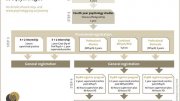
As a forensic psychologist, you may work in the court system as a jury consultant or as an expert witness testifying on the mental state of a defendant when a crime was committed. You may provide evidence regarding the competence of a person to stand trial.
As a forensic psychologist, you are combining psychology with law and may work with correctional facilities, psychiatric hospitals, or community agencies in performing risk assessment of future behavior of an individual. You may also provide psychotherapy or agency referrals to alleviate psychiatric symptoms that led to criminal behavior.
Forensic Psychologist Requirements
In addition to an undergraduate degree in psychology, you will need a Master’s Degree to qualify for a career position in forensic psychology. A Master’s in forensic psychology is becoming more available through colleges and universities nationwide. There are also satellite and online schools offering an M.A. in forensic psychology that allow flexible schedules that can fit well as you are obtaining work experience in psychology or psychotherapy while you pursue the forensic qualification level.
Your goal is an education that trains you as a psychologist first and merges that with knowledge of the criminal justice system, an understanding of the impact on victims and an understanding of the mental processes of the criminal mind.
At the forensic level, additional training is needed in such areas as evidence-based intervention, advocacy, and related general areas. Further education and experience may be required for more specialized careers such as that of a hostage negotiator or the study of de-escalation psychological techniques.
The U.S. Bureau of Labor Statistics projects career employment in this field to grow 15% through 2016. A PhD is not required to begin your forensics psychology career but will lead to higher income. Also the competition for available jobs is much lower for those with post-graduate degrees, like a PhD.
Forensic Psychologist Education and Training
If you have a Bachelor of Science degree you might choose to obtain graduate training at one of the schools dedicated to the practice of forensic psychology. These colleges and universities grant a degree in forensic psychology in about 2 to 4 years. You will receive not only classroom instruction but hands-on training will commence by working in prisons, clinical treatment facilities, and law enforcement.
The Master’s Degree in Forensic Psychology opens the door to working in more advanced roles within law enforcement, courts, prisons and probation, as well as in academic pursuits.
Forensic Psychology – Salary
The median salary of a Forensic Psychologist listed by the Bureau of Labor Statistics is $59, 440, with the highest paid forensic psychologists earning more than $103, 000. Salary is commensurate with experience, as well as education, and may be supplemented by consulting work and court testimony.
The median salary range is approximately $45, 000 at the lower end of the education and experience spectrum to as high as $77, 000. Salaries vary widely depending on the type of workplace; with non-profit organizations paying the lower salaries and with state and local governments paying the highest annual amounts.
Source: criminaljusticeonlineblog.com
You might also like:



|
Got Forensic Psychologist? Career Profession Embroidered Adjustable Hat Cap Black Apparel ()
|















I would suggest going to a school in Texas and taking courses in criminal justice and psychology, then going to graduate school in clinical psychology. You are likely to need a graduate degree to qualify as an expert witness.
In order to be a forensic psychologist (or any kind of psychologist) you will need a doctorate degree. I don't think you can call yourself a psychologist if you only have a masters. As for the PsyD and PhD issue, if you only want to work with clients, go for the PsyD (you will most likely have to attend a private university for that, though). If you want to also be able to be involved in research or if you don't mind going to a school with a highly research based and academic type curriculum in which you will have to write a thesis, go for the PhD (usually offered at state universities,…
There are few schools that offer that degree, however clinical, social, cognitive, criminal investigative, Psy. are relevant. Cha!
Sure is. Definitely pick psychology because forensics are needed so you can actually think about different positions, why it happened and put yourself in others' shoes.
I actually wanted to do forensics because I love thinking about different reasons why and it happened.
Good luck in your career. :)